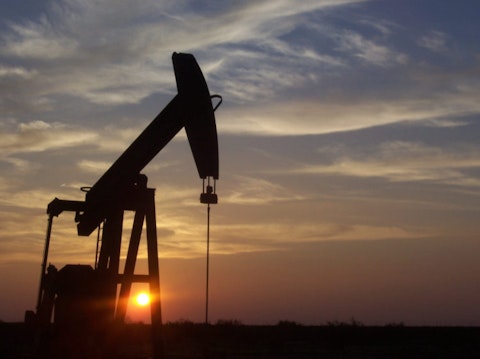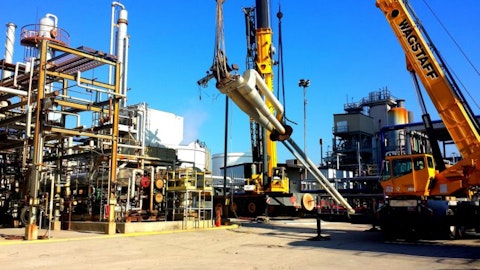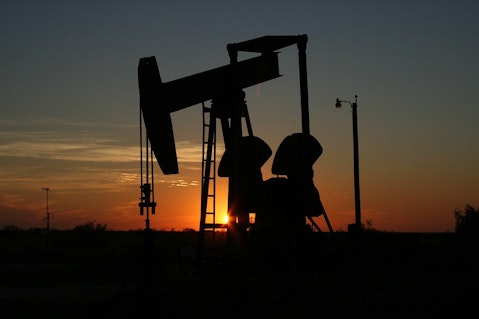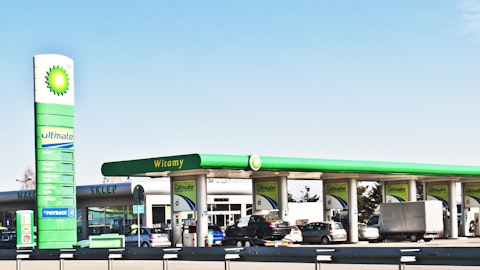In this article we are going to list the 11 countries with the largest oil reserves in the world in 2021. Click to skip ahead and jump to the 5 Largest Oil Reserves by Country in the World in 2021.
There are perhaps few resources more important globally than oil. Since the mid 1950s, oil has been considered the most important energy source globally, and has in fact been the cause of a lot of tension and even war. Without oil, modern society would not exist, being the main source of supply to the power sector, in addition to providing fuel for airplanes and of course, vehicles to transport people and goods across. In the United Kingdom, 97% of transport demands are met through oil, simply underscoring how essential it is. The refined products of oil are used in many other vital products such as plastics, detergents and even medicine in addition paints.
Do you know why the Middle East is so rich? Countries such as Saudi Arabia, Kuwait, Qatar, United Arab Emirates and multiple others are extremely rich with some of the highest capita incomes in the world because they have vast reserves of oil. These countries, before the discovery of oil, were basically deserts with little infrastructure and a very basic economy, but the discovery of oil literally transformed their fortunes, which has now become the basis of their economies. In fact, especially for Saudi Arabia, oil has give them not just riches, but power and influence as well. After all, why else would the United States, the so called champions of justice, not punish Muhammad Bin Salman, even after a declassified CIA document revealed he was behind the Khashoggi assassination? Many people criticized Donald Trump when he refused to take action against Saudi Arabia, though even now that there is conclusive proof that Prince Salman was behind the assassination, the new Democrat President Joe Biden has also refused to take action against the Crown Prince. The reason is pure and simple; money. The United States has enjoyed a healthy partnership with Saudi Arabia, with the latter purchasing arms worth hundreds of billions of dollars from the former, and no President can bear to be the one axing such a deal. Had it been a lowly nation such as Iran, Pakistan or Bangladesh, the United States wouldn’t have hesitated to act at all. Such is the power of Saudi Arabia, with said power being derived from oil.

Oil reserves aren’t just reserved to the Middle East of course; one of the most highly developed countries in the world, Norway, also derives its wealth mostly from its vast oil reserves. It doesn’t make our list of the countries with the biggest oil reserves, but the country’s oil reserves are the reason why it has become so wealthy. It has invested this money really well though, and has one of the highest standards of living in the world, as well as being among the countries with the happiest people in the world. The country has even invested a lot of money into becoming carbon neutral and spent money on using renewable energy resources. However, it has been criticized for obtaining this money through selling fossil fuels to other countries and hence, on a global level, actually having a negative impact on climate change.
However, the one thing to note about oil is that it can often be volatile, both in price as well as in volumes. In 2019, oil production was lower than in 2018, even thought the United States actually reported an increase in output. This was more than offset by the decrease in production from OPEC countries, led by Iran and Saudi Arabia, even as oil consumption grew at a below average rate of 0.9%, with this growth being led by China and developing countries, though this demand fell in countries belonging to the Organization of Economically Developed Countries.
Despite the fluctuations in 2019, it was really 2020 which was quite disastrous for the oil industry. We all know what happened later in 2020, but even the start of the year was not auspicious at all for the oil sector as Russia and Saudi Arabia engaged in an oil price war, which saw the price plummet. When these two countries failed to agree on oil production levels, both countries started reducing prices which spelt disaster for the companies engaging in this industry. Even though the price war ended just a month later, the damage was done. OPEC finally agreed to reduce oil output by 9.7 million barrels daily, which was the biggest oil production cut in history. This limited the production of oil to 7.7 million barrels daily for the second half of 2020.
The other big thing in 2020 was of course, the Covid-19 pandemic, which has swept the world and caused more than 2.5 million deaths across the world. When what was initially an epidemic transformed into a pandemic, most countries went into lockdowns to stem the spread of the virus and reduce infections and death. This caused global economies to tumble and resulted in extreme uncertainties. Further, since people were in lockdown and traffic almost came to a standstill, demand dropped exponentially and resulted in prices being reduced further. This resulted in history, when futures for oil expiring in May 2020 turned negative, which meant that producers of oil were actually paying customers to take oil off their hands, due to fears that storage capacity for oil would run out. Prices eventually rebounded as lockdowns started to be eased, and with vaccinations being implemented, normalcy is expected to some extent by the end of this year.
Now despite the volatility that the oil industry has experienced over the past year and more, some of the countries with the biggest oil reserves are still among the wealthiest nations in the world and this is not going to end anytime soon. Just the top 11 countries have more than 1,500 thousand million barrels of proven oil reserves, according to BP Plc (NYSE:BP). These countries are spread across the globe geographically, with presence in South America, North America, Middle East, Africa and South Asia being accounted for. Funnily, many of these countries are embroiled in political turmoil as well as battling with poverty, despite being lucky enough to have large reserves of the most valuable energy source in the world. By the way, BP Plc recovered its 2020 stock price losses, but BP shares still trade 40% below their 2018 peak. This may be a good time to invest in BP as the company tripled its income during the first quarter of 2021 and the company committed to $500 million to share buybacks in the second quarter.
Keeping this in mind, let’s take a look at the countries with the largest oil reserves in 2021, starting with number 11:
11. Nigeria
Total oil reserves of the country at the end of 2019 (in thousand million barrels): 37
Share of total oil reserves in the world at the end of 2019 (in percentage terms): 2.1
Nigeria is one of the most populous countries in the world, but the benefits of being one of the biggest exporters and producers of oil have not really trickled down to the general population, which is why the level of poverty is still quite high.

Pixabay/Public Domain
10. Libya
Total oil reserves of the country at the end of 2019 (in thousand million barrels): 48.4
Share of total oil reserves in the world at the end of 2019 (in percentage terms): 2.8
Libya has been in freefall ever since the 2011 Libyan Civil War, and is a country completely dependent on the oil sector, which constitutes 97% of the total exports. The National Oil Corporation is the biggest oil company of the country.

Pixabay/Public Domain
9. United States of America
Total oil reserves of the country at the end of 2019 (in thousand million barrels): 68.9
Share of total oil reserves in the world at the end of 2019 (in percentage terms): 4
America is among the largest producers of oil, but despite its vast reserves, has to also import massive quantities to meet the demand in the country. It is home to some major oil companies including Chevron (NYSE:CVX), ExxonMobil (NYSE:XOM), Marathon Petroleum (NYSE:MPC) and ConocoPhillips (NYSE:COP).

Barry Blackburn / Shutterstock.com
8. United Arab Emirates
Total oil reserves of the country at the end of 2019 (in thousand million barrels): 97.8
Share of total oil reserves in the world at the end of 2019 (in percentage terms): 5.6
The UAE transformed into a global destination as the proceeds from oil were spent on diversifying its portfolio, which is why Dubai is one of the biggest global tourist destinations. Its biggest oil company is the state-owned Abu Dhabi National Oil Company.

Kanok Sulaiman/Shutterstock.com
7. Kuwait
Total oil reserves of the country at the end of 2019 (in thousand million barrels): 101.5
Share of total oil reserves in the world at the end of 2019 (in percentage terms): 5.9
Kuwait has the highest valued currency in the entire world and that is mainly due to the high GDP and per capita income enjoyed by the country, mainly thanks to the oil reserves of what is a country of just 4.4 million people. The Kuwait Oil Company is the biggest oil company in the country, and is owned by the government.

Copyright: Elnur / 123RF Stock Photo
6. Russia
Total oil reserves of the country at the end of 2019 (in thousand million barrels): 107.2
Share of total oil reserves in the world at the end of 2019 (in percentage terms): 6.2
Russia is another country which has vast oil reserves and yet, due to the way the government operates, its citizens are still unable to enjoy a high or even moderate standard of living, with wealth being concentrated among a select few. Rosneft and Lukoil are by far the two largest oil companies in the country.
Please click to continue reading and see the 5 Largest Oil Reserves by Country in the World in 2021.
Suggested articles:
- 10 Best Oil Stocks To Buy Now
- 15 Biggest Oil Refining Companies
- 12 Largest Oil Tanker Companies In The World
Disclosure: No position in BP Plc (BP). 11 largest oil reserves by country in the world in 2021 is originally published at Insider Monkey.





